The best mountain bike jackets will keep you riding through all weather. As a result, this form of clothing is possibly the most important item in your winter wardrobe if you live somewhere wet or cold.
It might also be the most expensive piece of kit you own. You can spend a lot of money on mountain bike jackets, but do you have to?
Generally, the more you pay, the more you get, in terms of performance – by which we mean breathability, durability, features or a combination of all three. This isn’t always the case, though.
Working out exactly what you need your jacket for can help you narrow down your options and avoid spending money on features you don’t need.
Our expert testers have spent days and weeks out on the trails, putting different mountain bike jackets to the test while cycling in the rain and through the most difficult conditions, to bring you the best-performing options for every type of rider.
You can read our buyer's guide to mountain bike jackets at the end of this article for more advice on how to choose the best jacket for your needs.
Editor's Note: This article was updated on 3 January 2025.
Best mountain bike jackets in 2025
7Mesh CoPilot
SQUIRREL_TEXT_13083764
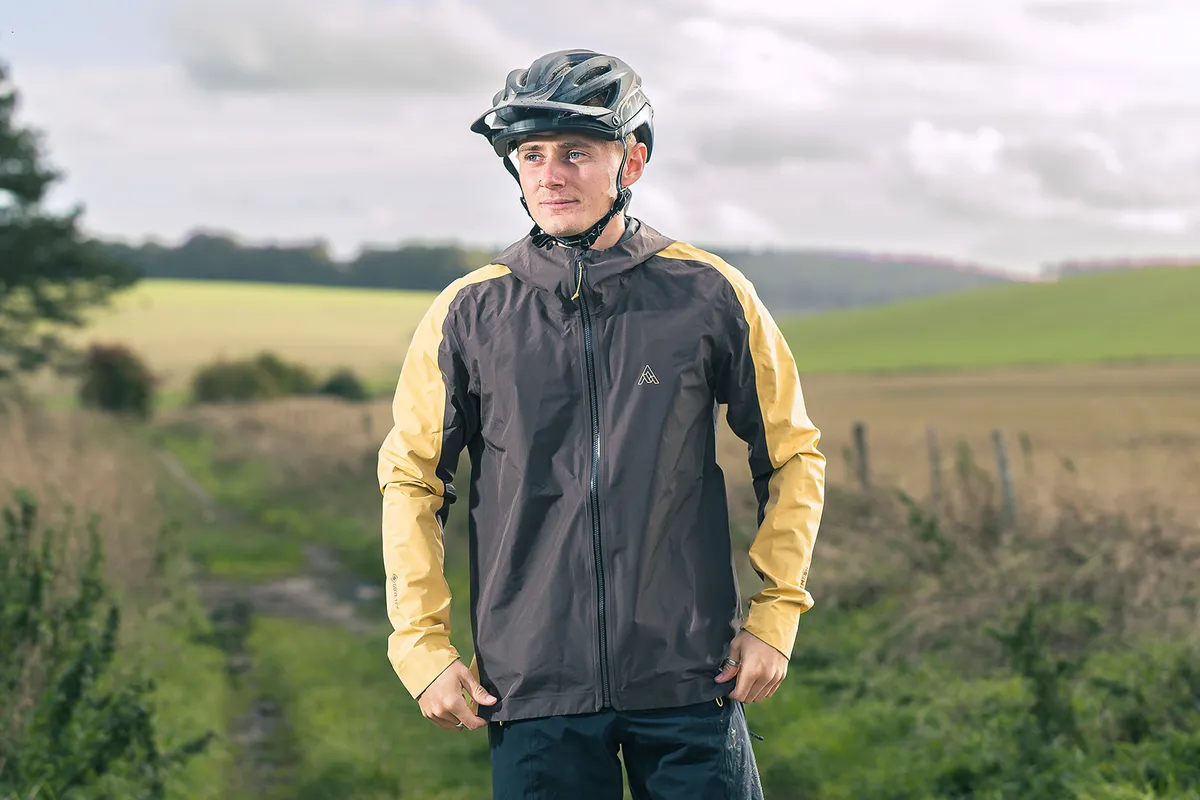
- £250 / $280 / €280 as tested
- Protection: Waterproof
- Pros: Laidback cut; wards off bad weather
- Cons: Larger zip pulls would help when wearing winter gloves
The updated version of the 7Mesh CoPilot jacket is more orientated towards bikepacking, having a looser fit and readily packing up into its back pocket.
You can then use the pocket straps to wrap the CoPilot to your bike frame.
The CoPilot's hood can be worn over your helmet and stays in place once you've tightened the adjustment cords.
By retaining its predecessor's Gore-Tex Paclite Plus material, the 7Mesh CoPilot keeps you dry on multi-hour wet rides.
SQUIRREL_13083764
Endura MT500 Freezing Point Jacket
SQUIRREL_TEXT_13122360
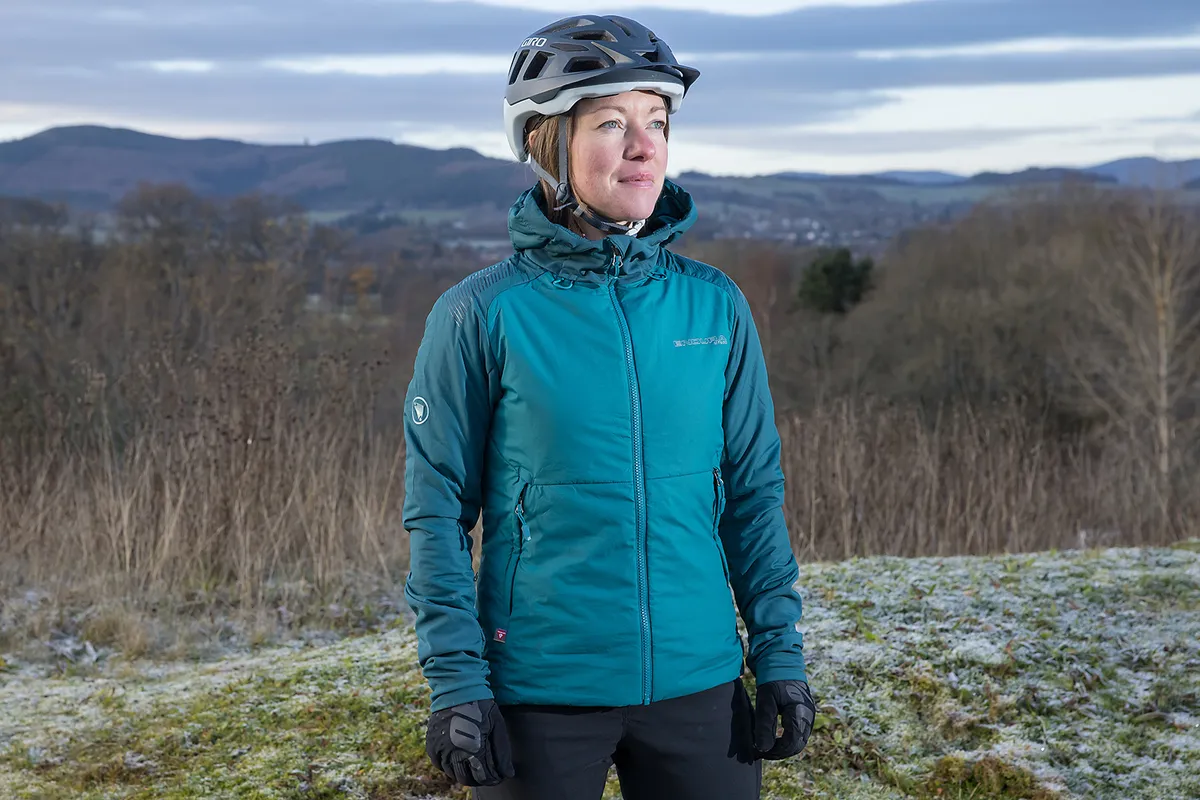
- £164.99 as tested
- Protection: Softshell
- Pros: Impressive flexibility with sleek styling; good balance between warmth and breathability
- Cons: Hood doesn't fit well over a helmet
The MT500 Freezing Point is made out of a four-way stretch thermal softshell fabric, and features PrimaLoft Gold Active insulation on the front panel to ward of wind chill.
Designed for colder days, the jacket warms up quick when climbing but long pit zips allow you to regulate temperature without taking the jacket off.
A PFC-free DWR finish keeps the water out efficiently, while the tailored fit allows for for extra layers beneath.
Although Endura don't claim the hood is helmet compatible, we found that it could squeeze over but it was quite restrictive.
SQUIRREL_13122360
Gore Endure Jacket
SQUIRREL_TEXT_13116733
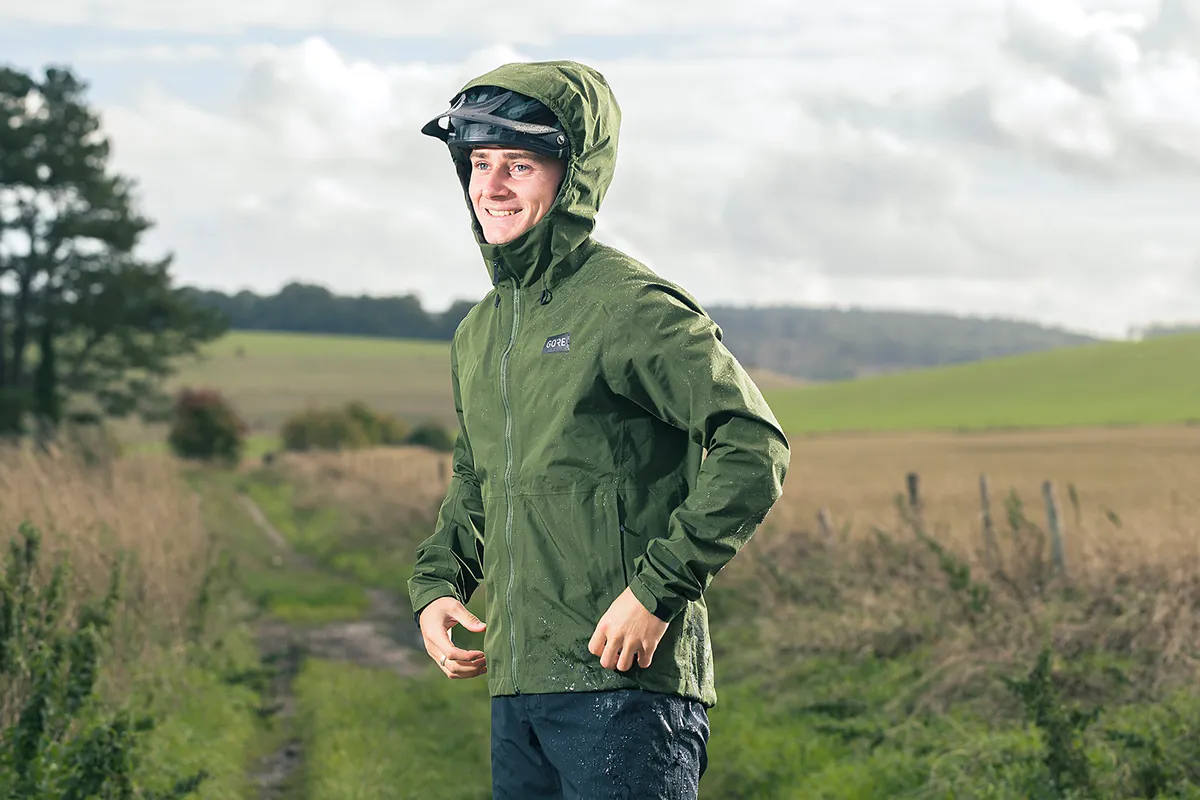
- £230 / $230 / €230 as tested
- Protection: Waterproof
- Pros: Well-considered fit; plenty of technical features
- Cons: Continued re-proofing required
The Gore Endure Jacket's styling and fit is relaxed enough to wear for everyday riding and even when off the bike, but its performance is top notch.
The Gore-Tex Paclite Plus material is claimed to be breathable and waterproof, but it does require regular reproofing.
There's a dropped tail to keep muck off your back. You can wear the peaked hood over your helmet and it's easy to adjust.
The Gore Endure jacket has two pockets and packs down itself into a pocket or hip pack.
SQUIRREL_13116733
Patagonia Micro Puff Hoody
SQUIRREL_TEXT_13157578
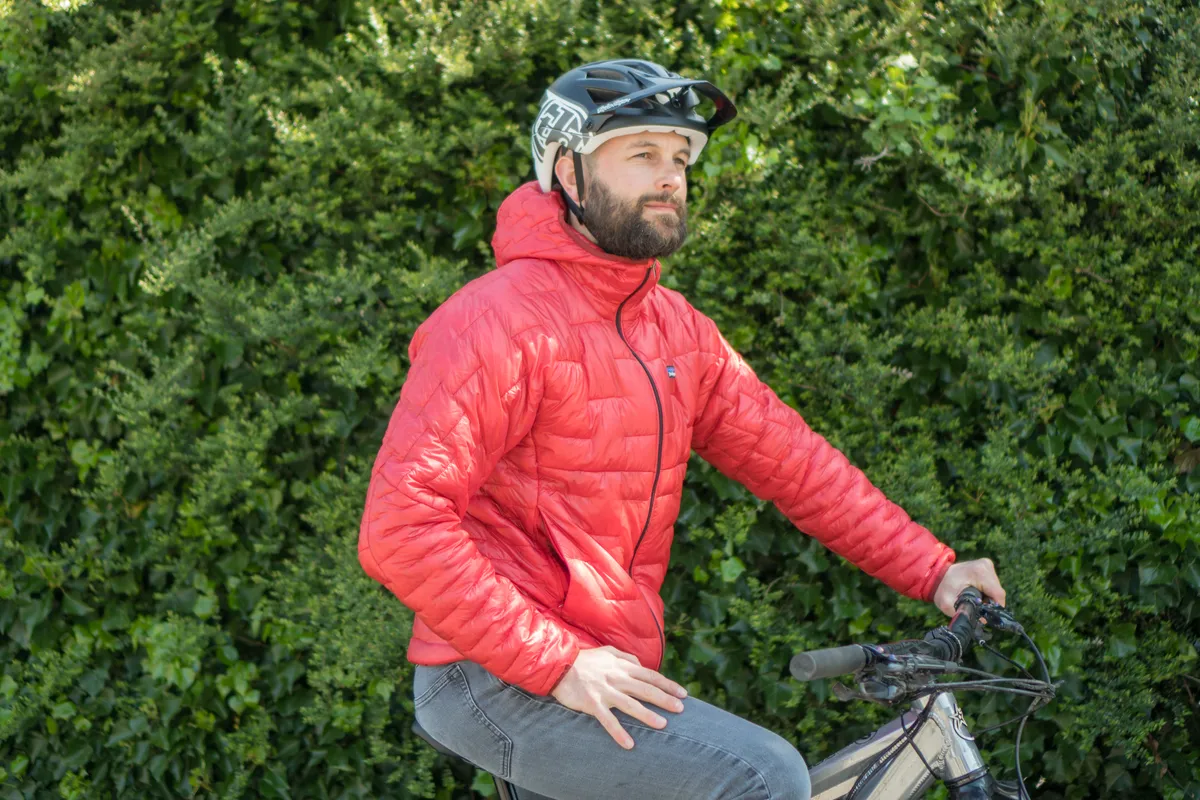
- £250 / $299 as tested
- Protection: Water-resistant
- Pros: Impressively warm; packs down into its own pocket
- Cons: Expensive; outer fabric might not resist long-term abuse
The Micro Puff Hoody from Patagonia is a lightweight, soft-shell garment that looks good both on and off the bike.
It's seriously warm thanks to the use of synthetic PlumaFill insulation and the DWR coating is effective, but we'd still recommend using this as a mid-layer in the worst of conditions.
Despite minimalist looks and a fit that's neither tight nor slack, it's full of useful storage pockets. It's impressively packable too, folding down neatly and easily into its own pocket. Our tester loves his so much that he's rarely seen without it.
SQUIRREL_13157578
Scott Insuloft Superlight PL
SQUIRREL_TEXT_13116744
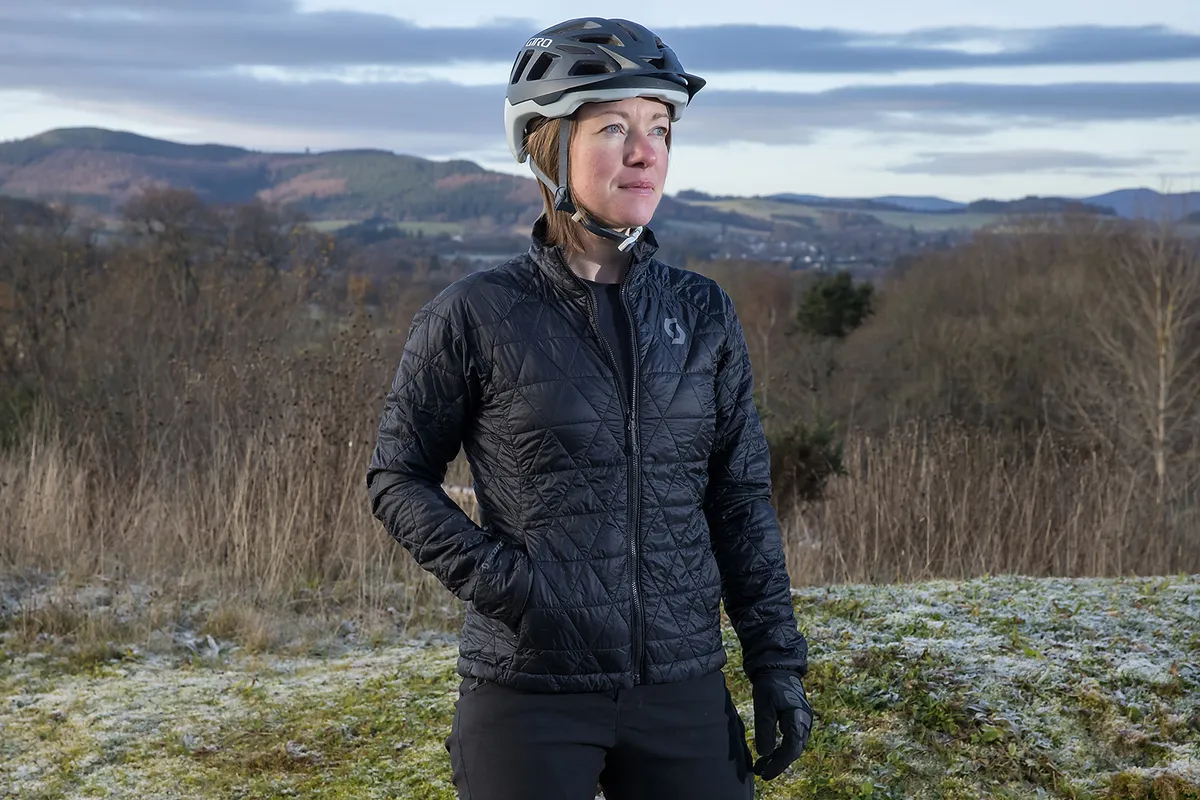
- £220 as tested
- Protection: Insulated jacket with DWR outer
- Pros: Lightweight and highly packable; great fit
- Cons: Expensive
Scott's Insuloft Superlight PL is very comfortable, with its lightweight and well-cut fabrics helping it look good on and off the bike.
It features a DRYOzone DWR outer layer, which stood up to the harshest of conditions and shed even the toughest downpour. The breathability impressed too, avoiding chill from sweat build-up.
The performance of the Scott Insuloft Superlight PL matches its high-end price, and the ease of packing into the chest pocket means you can always bring it with you.
SQUIRREL_13116744
Endura GV500
SQUIRREL_TEXT_13080380
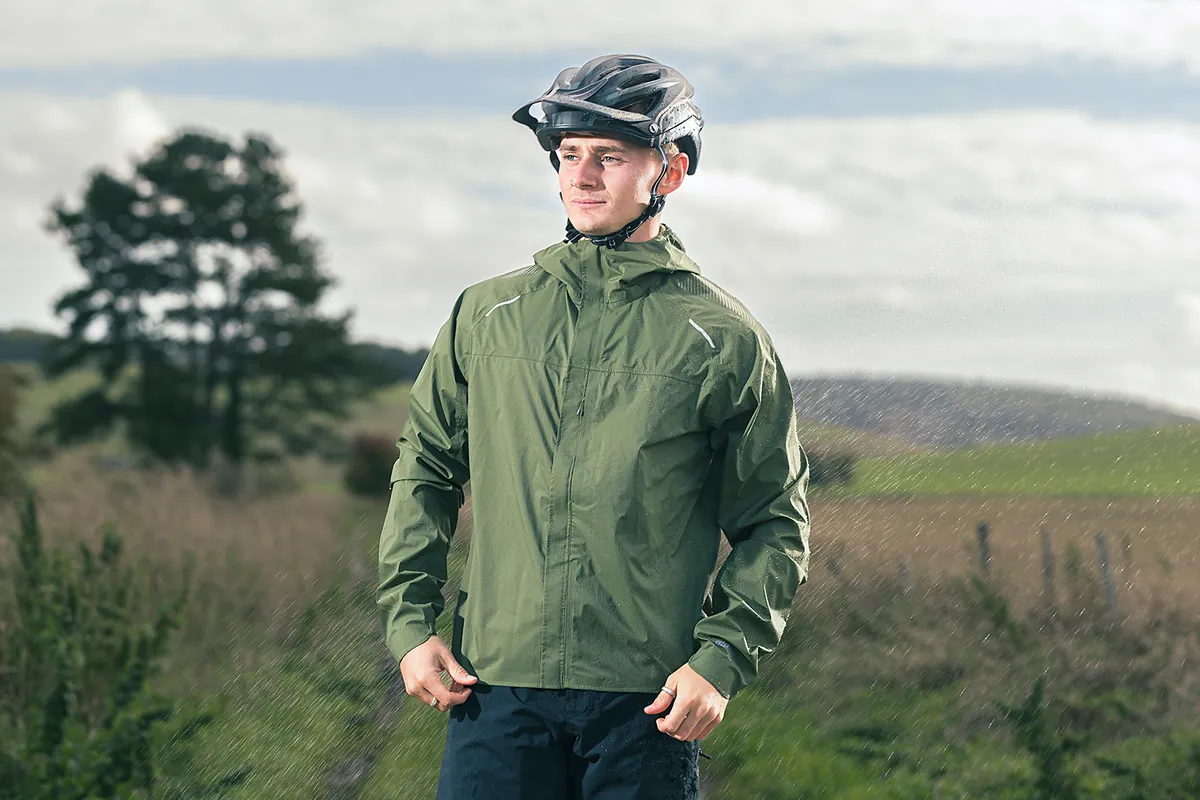
- £160 / $200 / €180 as tested
- Protection: Waterproof
- Pros: Fantastic value; high levels of protection
- Cons: Slightly tight under the arms
The Endura GV500 has many of the features and performance of much pricier waterproof jackets.
Its hood goes over a helmet without obscuring your line of sight. A lowered tail protects your back and the GV500 can be stowed in its single chest pocket.
The cut treads the right line between slim and tight, so the GV500 doesn't restrict your movement, except to a degree in the arm areas.
The Endura GV500 is comfortable whichever layer you wear beneath it. Waterproofing is impressive and breathability isn't far behind.
SQUIRREL_13080380
Giro Ambient Jacket
SQUIRREL_TEXT_13082297
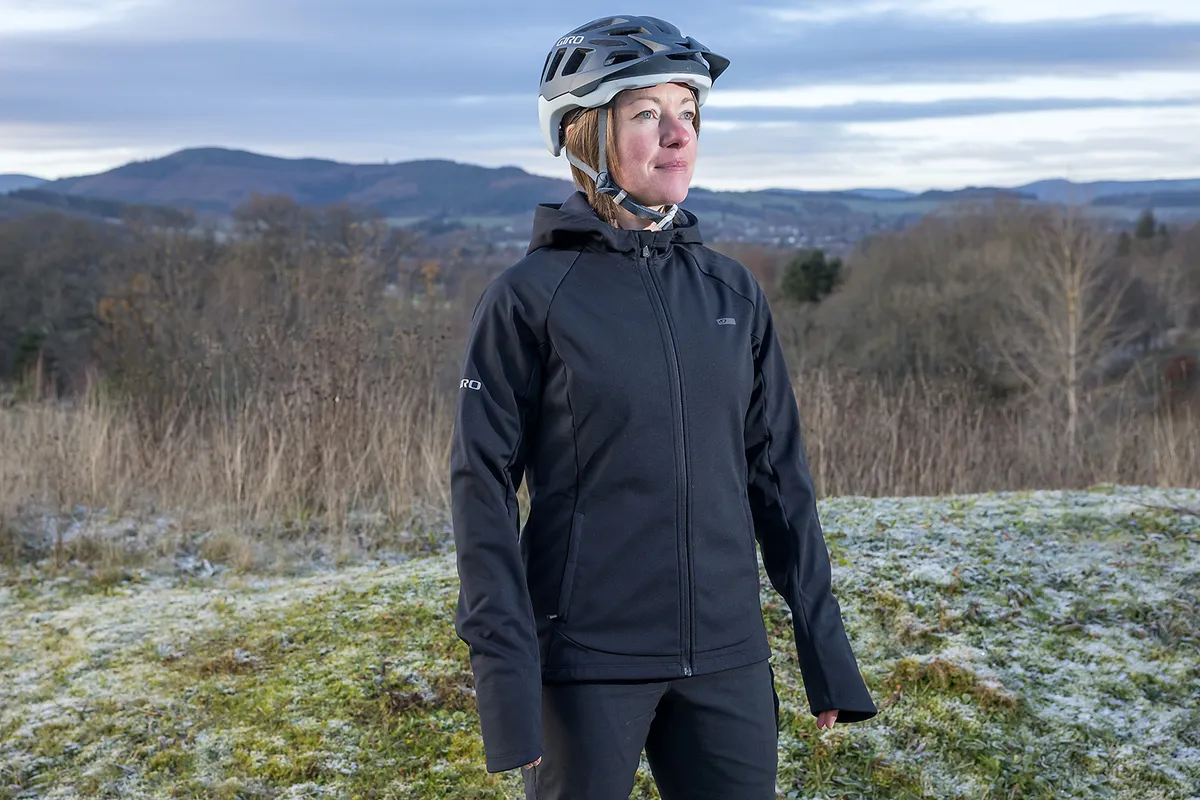
- £119.99 as tested
- Protection: Softshell
- Pros: Impressive warmth and waterproofing; large hood aids movement
- Cons: No women’s XS option; heats up rapidly on the climbs
The Giro Ambient is a three-layered fleece softshell featuring a four-way stretch fabric on the outer. Although not fully waterproof, we found it kept most of the water out on long, wet rides, while the hood provided good protection without getting in the way.
Best suited to cold days, we found the jacket overheated above 5 degrees, with the laser-cut vents in the armpits doing to little to stop this resulting in a full unzip.
Large, well-placed pockets enable you to carry your belongings without them getting in the way of your riding. Lycra gaiters complete with thumb holes make sure your sleeves stay in place.
SQUIRREL_13082297
Madison Roam Men’s Lightweight Windproof Packable Jacket
SQUIRREL_TEXT_13103233

- £70 as tested
- Protection: Windproof
- Pros: Cut and fit of more expensive jackets; roll-up hood; budget-friendly
- Cons: Noisy fabric, but not a deal-breaker
The Madison Roam is a lightweight shell designed to be carried at all times for emergency use. It lands at a competitive price point, but doesn’t skimp on fit or functional features.
The Roam features a stretch-fit and a refreshable C0 DWR coating, as well as a two-way front zipper and elasticated cuffs and hood.
The fit and features are equivalent to those of more expensive riding jackets, making it comfortable to wear whatever the conditions. The real difference is to be found in the fabric, which is on the noisy side. However, it’s a minor issue and, at around half the cost of similar jackets, it’s not likely to be a deal-breaker for most of us.
Overall, the Madison Roam provides great value for money, but not at the expense of performance and features.
SQUIRREL_13103233
Patagonia Dirt Roamer Storm
SQUIRREL_TEXT_13116725
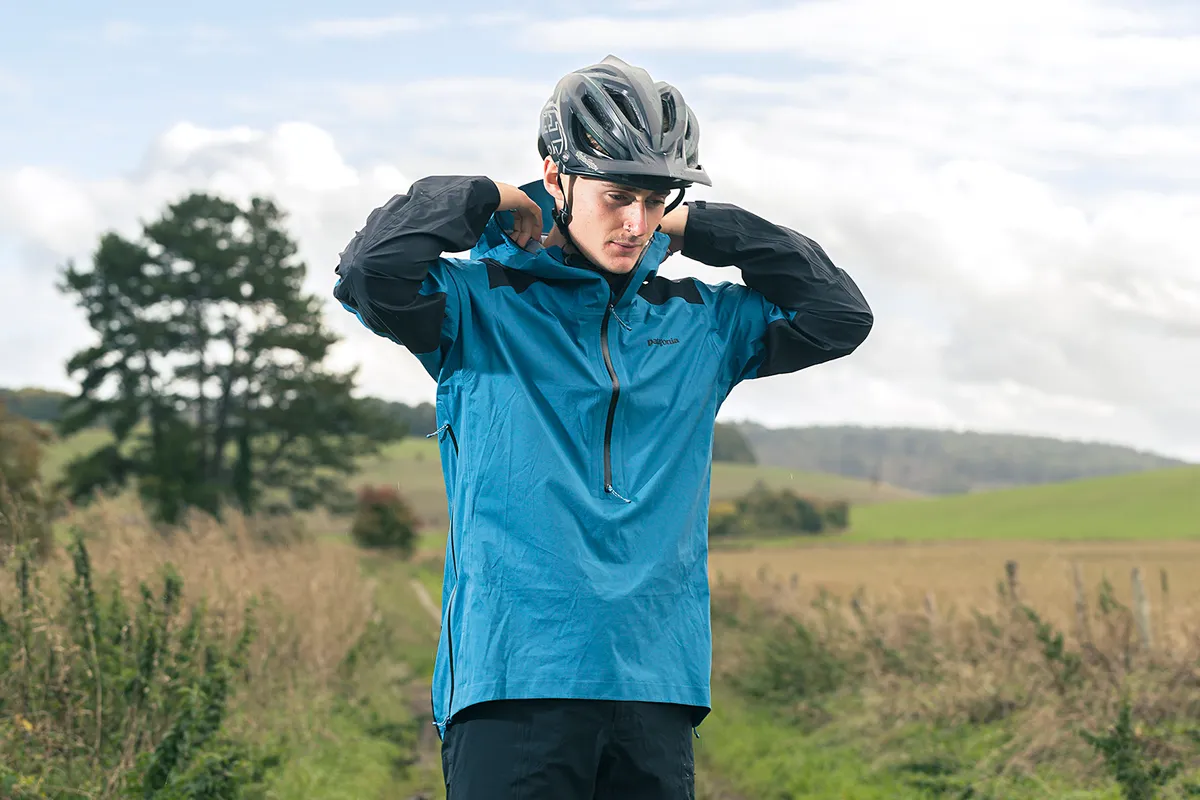
- £290 / $290 / €320 / AU$490 as tested
- Protection: Waterproof
- Pros: Comfortable fit; storm-resistant; practical features
- Cons: Over-head style might not be for everyone
The premium Patagonia Dirt Roamer Storm jacket is the completely waterproof version of the Dirt Roamer jacket that also figures in this list.
The Dirt Roamer Storm has to be worn with the hood over your head or helmet. In order to remove the jacket, you'll have to take off your helmet.
To reduce how often you need to do so, Patagonia has placed zipped vents on the side and front of the jacket.
The Dirt Roamer Storm's triple-layered H2No shell wicks sweat as well as repelling rain.
SQUIRREL_13116725
Rab Cinder Borealis
SQUIRREL_TEXT_13116819
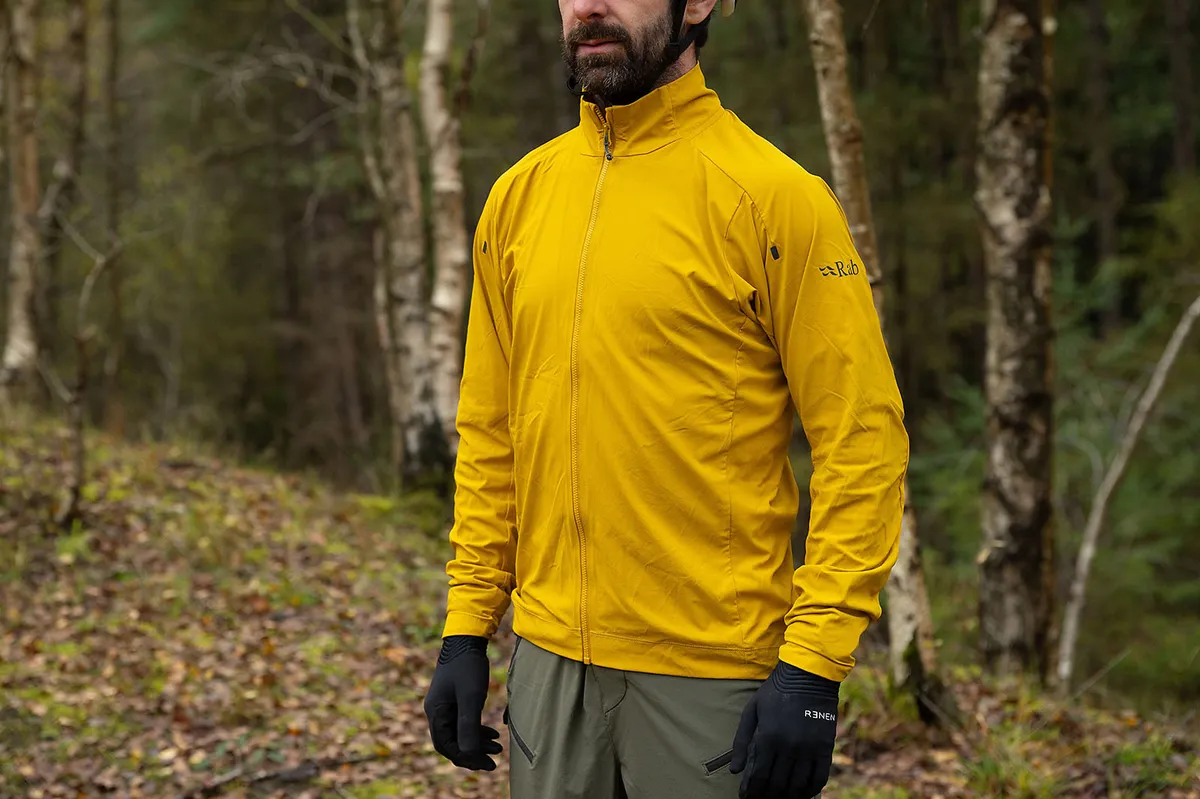
- £100 / $120 / €140 as tested
- Protection: Wind-resistant
- Pros: Good cut with accurate sizing; breathable; packs down well
- Cons: Poor wet weather ability; would benefit from another pocket
The Rab Cinder Borealis offers a comfortable fit and works well to fend off the chill of autumn and spring.
A tailored cut makes the jacket well suited to riding, with a snug fit keeping ballooning and flapping to a minimum.
The Cinder Borealis packs down small into a single rear pocket, making it easy to carry on unpredictable days.
We found the amount of pockets and wet weather ability to be a limitation with the jacket, with the fabric not responding well to anything more than a quick shower.
SQUIRREL_13116819
Specialized Men’s Trail Wind Jacket
SQUIRREL_TEXT_13147467

- £100 / $130 / €130 as tested
- Protection: Windproof
- Pros: Well-designed; wear-and-forget style; versatile
- Cons: Even well-designed pullovers are less convenient than a front zip
The Specialized Men's Trail Wind is a pullover-style jacket with a slim, active fit. The fabric is soft and, even though windproof, it doesn’t overheat when you’re working hard. The perforations across the shoulders, combined with the front zip, enable effective cooling.
The jacket packs quickly into its single pocket, with a generous zip-pull making it easy to unfurl, even with winter gloves on. The deep front zip of the Trail Wind also ensures it pulls on easily, even over a helmet.
While the pullover style might not be for everyone, the Specialized Men's Trail Wind impresses with its minimal lines, maximum functionality and small pack size. It could make the Trail Wind your go-to extra layer.
SQUIRREL_13147467
Troy Lee Designs Mathis
SQUIRREL_TEXT_13082294
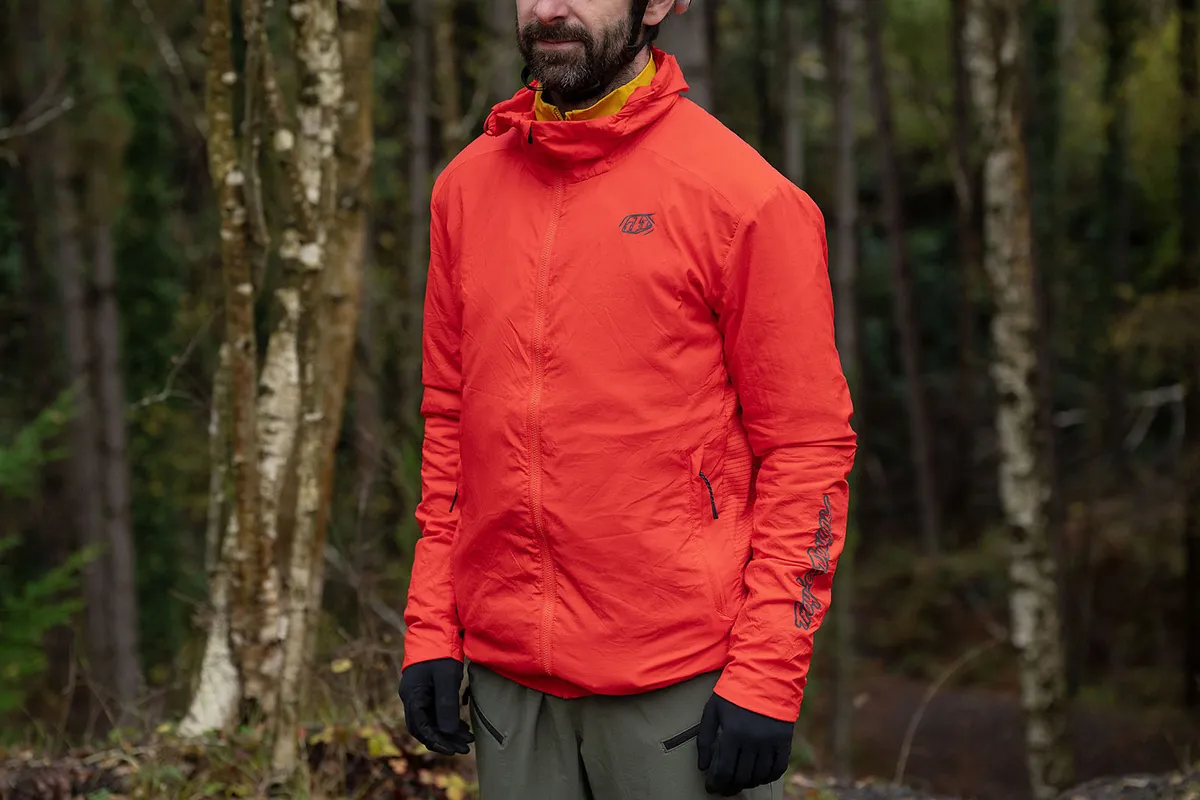
- £140 / $150 / €180 as tested
- Protection: Water-resistant, insulated
- Pros: Good levels of warmth while remaining breathable; lightweight with a good pack size
- Cons: Neck is a tad baggy and the hood is prone to flapping about
The Troy Lee Designs Mathis does a good job of keeping you warm on cold rides thanks to its insulated core.
Breathable side panels keep the Mathis from overheating keeping you from getting warm and clammy on cold days.
Its lightweight and small pack size makes the Mathis no chore to carry reducing the pain of over-dressing.
The hood and neck area is quite baggy leading to flapping during high wind or high speed, but the casual look of the jacket makes it wearable on and off the bike.
SQUIRREL_13082294
Velocio Ultralight Trail Hooded Jacket

- £140 as tested
- Protection: Windproof/water-resistant
- Pros: Light and breathable fabric; comfortable feel; immaculate fit
- Cons: Zip pull could be longer for easy unpacking
Made using Pertex Quantum Air fabric, which weighs in at only 50gsm, this jacket boasts water-resistant, windproof and breathable performance for high-intensity riding - all at just 127g.
The Pertex fabric is not only light, it feels comfortable against the skin, making it ideal over short-sleeved jerseys on warmer days. Usually, a windproof/water-resistant jacket goes on when you need it, and packs away when you don’t, but the Velocio’s immaculate fit and breathable comfort meant that after pulling it on for cool autumn starts, we often forgot we were wearing it.
The jacket packs easily into its rear pocket and here’s our only gripe – we’d have liked a longer zip pull to make the unpacking process easier when wearing gloves.
Why you can trust BikeRadar
BikeRadar has been an authority on bikes and cycling tech since its inception in 2007, delivering the world’s best riding advice.
We have experts testing all types of bikes, parts, clothing and accessories, from road, mountain and gravel bikes to commuting, bikepacking and electric bikes.
Our reviews are always editorially independent – with no exceptions. Our reviewers comprehensively test all products in the real world, always reflecting on performance, value and the wider market when delivering their verdicts and review ratings.
We have more than 15,000 product reviews available at your fingertips, as well as expert buying, maintenance, training, skills, health and fitness advice.
Our annual Bike of the Year test is an industry benchmark and the BikeRadar team consists of some of the most experienced riders and testers in the business.
What to look for in a jacket for mountain biking
Water-resistant zips
These keep wind and rain out without the need for a storm flap. They’re easy to identify by the smooth seal that closes protectively over the teeth, but can be stiff to use.
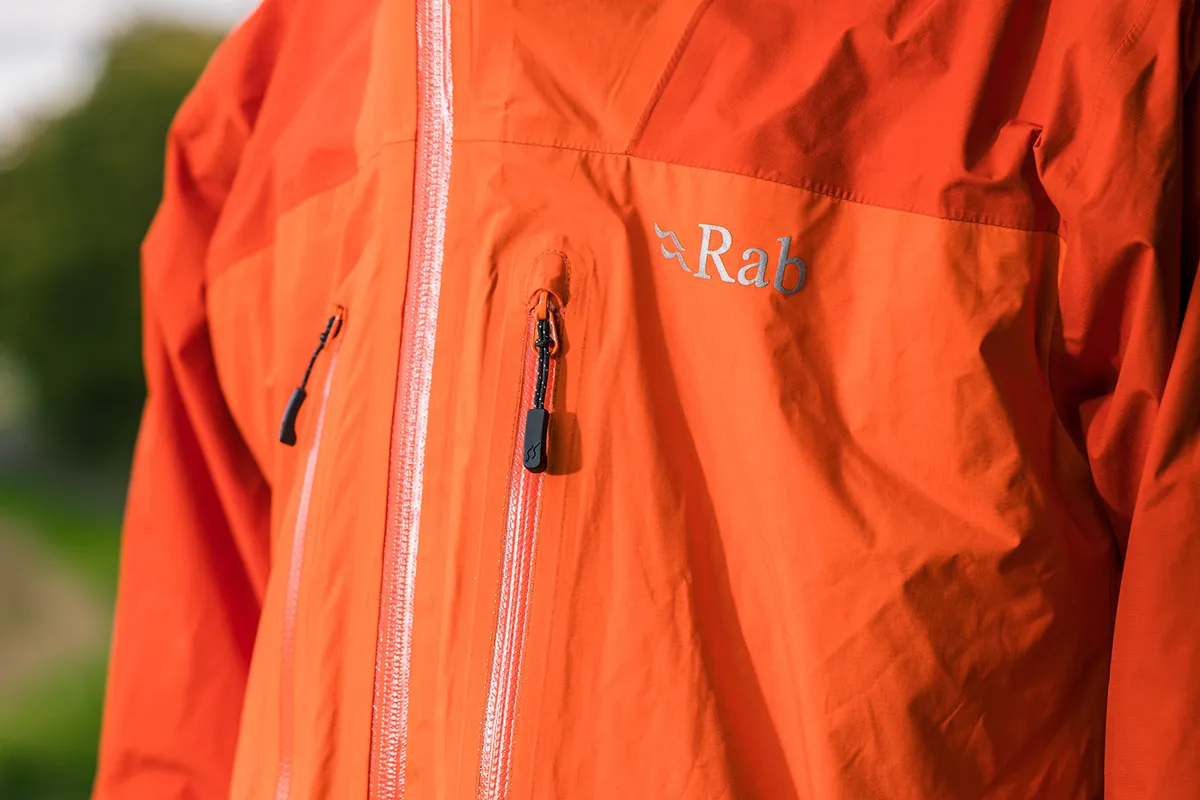
Two-way zips
Double zips allow you to open the jacket from the bottom as well as the top to help you cool down faster – useful when you’re working up a sweat.
Drop tail
A longer back to ensure your lower back is covered and help keep mud and spray off the seat of your shorts or riding trousers.
Adjustability here is also handy, so look for elasticated drawcords to help you cinch in the hem. Check the length is right for you by jumping on a bike when you’re trying a jacket on.
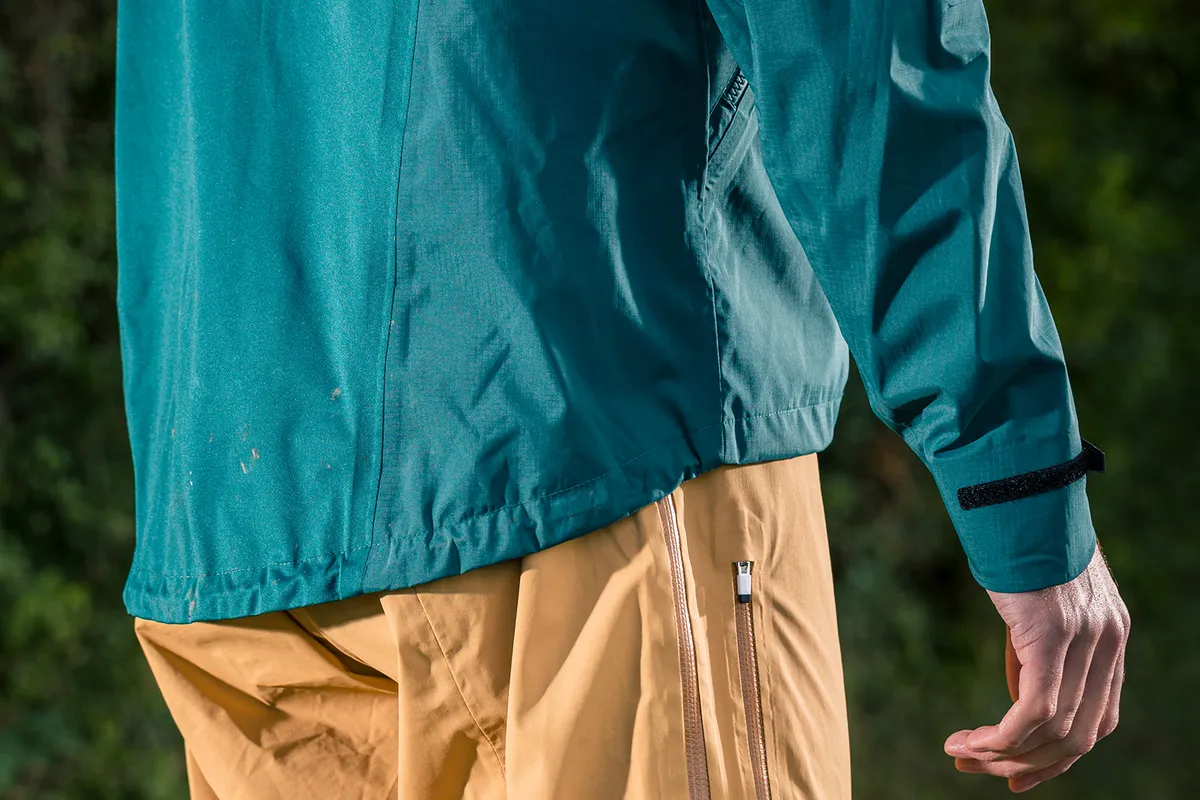
Dropped cuff
Cuffs that are shaped to extend over the back of the hand integrate with gloves more smoothly than those with Velcro adjusters, and channel rain over, rather than inside, your gloves.
They’re also more comfortable to wear, moving freely with your body as you ride, and shed water better, because there are no creases for moisture to gather inside.
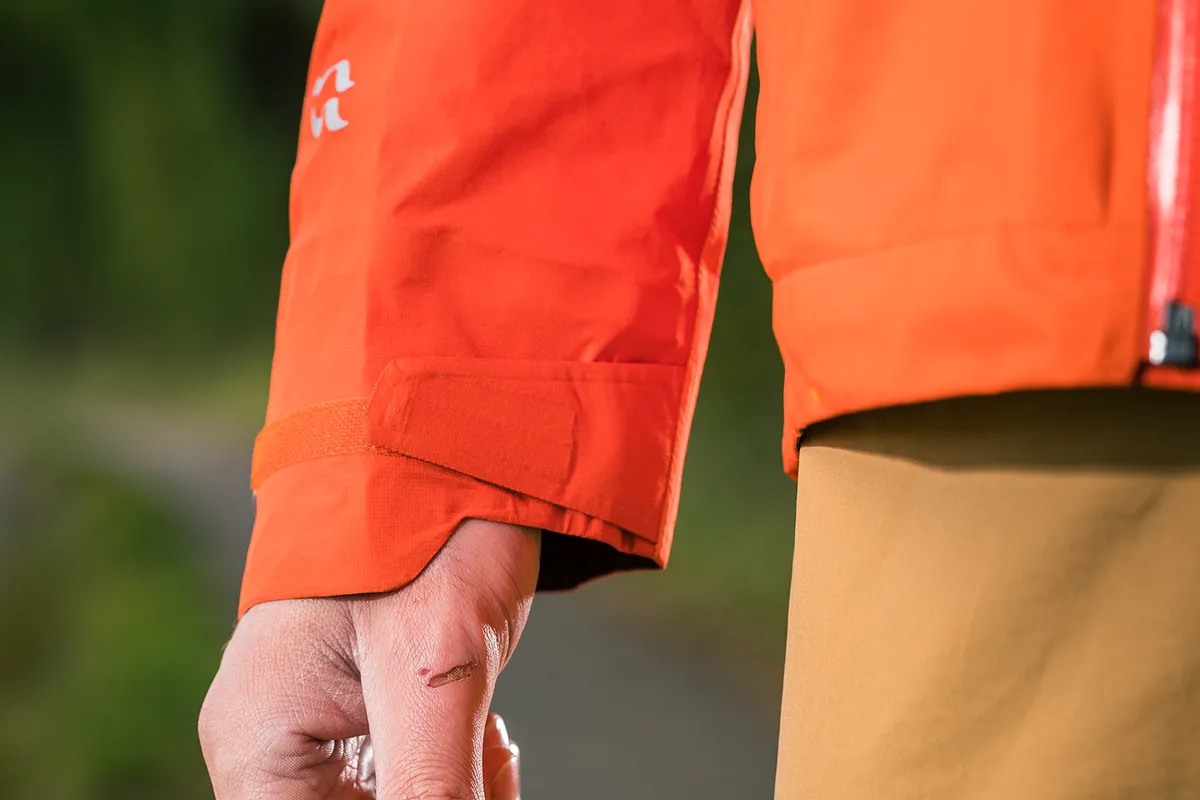
Lined collar
A fleecy inner collar not only feels more comfortable against your skin, it absorbs stray drips before they run down your neck too.
Helmet-compatible hood
A hood that goes over a helmet is our preferred style for practicality, although some riders like one that fits underneath. Check it can be cinched in to reduce its volume and keep your peripheral vision clear.
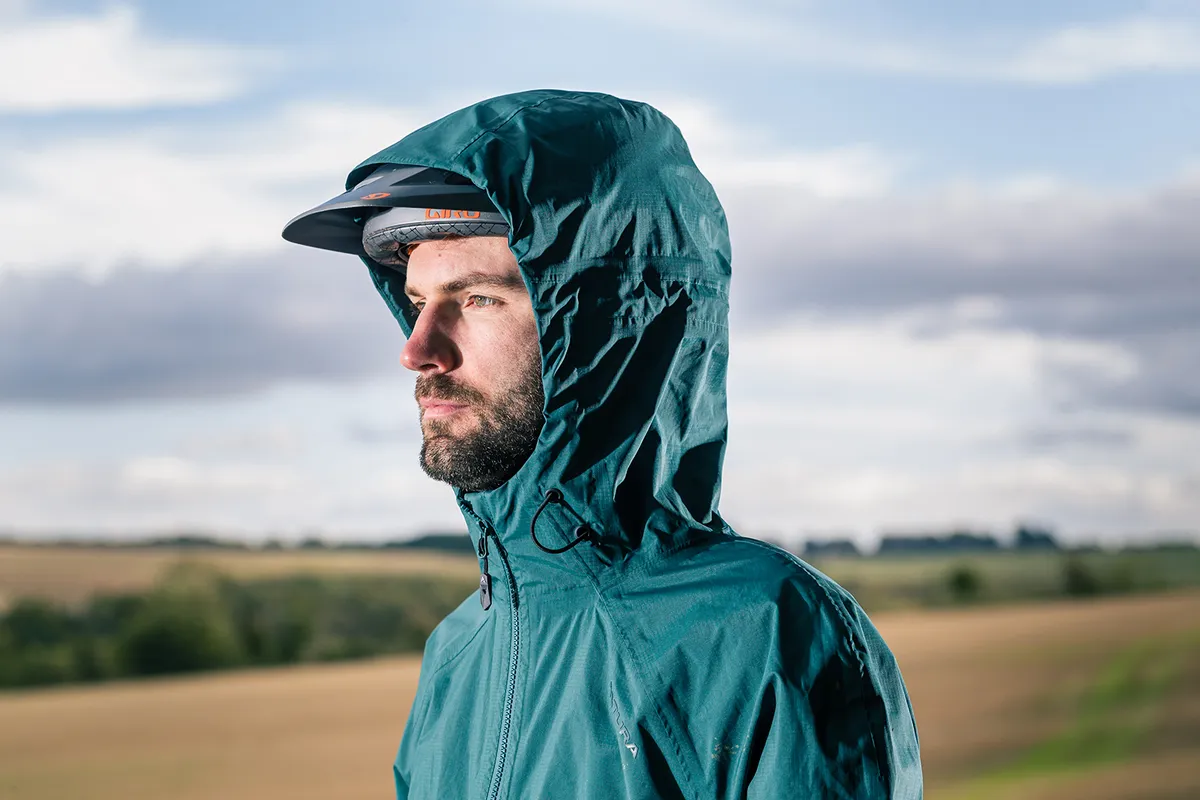
Vents
Vents help heat and sweat to escape. They can either be zipped or open with gill-like slits. If you wear a hydration pack, check the straps don’t obstruct the jacket’s vents, and look for double-ended zips, which give more ventilation options.
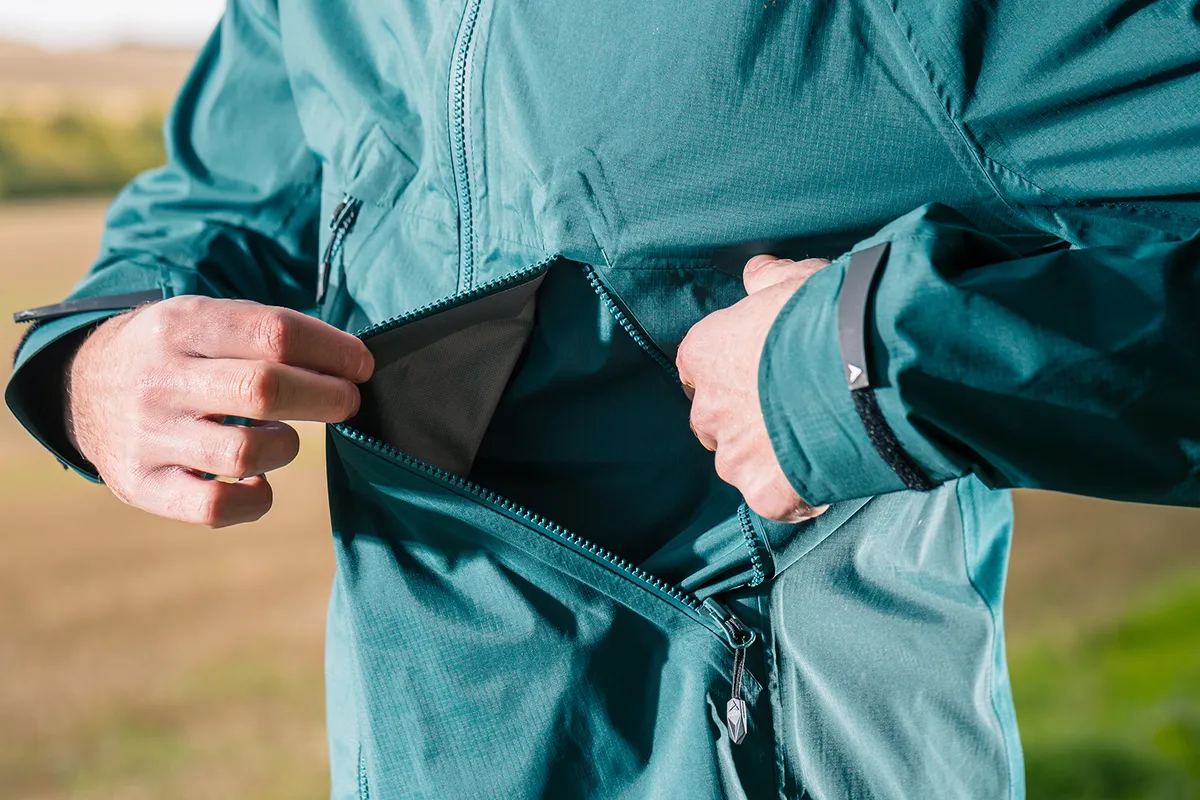
Jackets explained
Breathability
Multi-layer fabrics can be both waterproof and breathable because the membrane layer has lots of tiny pores. These pores are large enough for water vapour to escape, but too small for water droplets to pass through.
The breathability is the rate at which a fabric allows heat from inside to escape, in the form of water vapour, measured as the Water Vapour Transmission Rating (WVTR).
Search for ratings over 20,000g/m²/24hr for good material breathability. There is, however, a limit as to how breathable any waterproof fabric can be if you’re riding hard or the weather is warm.
Waterproofing
The waterproof rating of a fabric will tell you if it’s suitable for wet-weather riding, from fine drizzle through to a prolonged downpour. This is measured in a lab, testing the height of a 1in diameter column of water that a fabric will withstand before it leaks, measured in millimetres.
Higher numbers here indicate a greater resistance to water seeping through. As a guide, 10,000mm is a good benchmark, with 20,000mm better for prolonged or extreme conditions.
If you’re looking for a waterproof for wet-weather riding, double-check that the seams are taped: otherwise, these are weak points for waterproof garments.
Insulation
Insulated jackets come in various forms, with fleece and baffled constructions both used to trap warm air to create a barrier between you and the outside cold.
Insulated jackets aren't usually as waterproof as other jackets, because more breathability is needed to stop chill from sweat build-up on the inside.
Mountain bike jackets will usually use a synthetic fill in baffled designs because even the most hydrophobic of down will struggle to cope with the constant washing that muddy clothes need.
The amount of fill is a good indicator as to how warm a jacket will be, because the more there is, the more air will be trapped. However, jackets with less fill can be just as effective when used with other layers.
Three-layer fabric
A fabric consisting of an outer shell over a waterproof membrane with an inner backing.
This lining helps protect the membrane and prolong the life of the jacket. It also gives a smoother feel against the skin, and may have wicking properties, too.
2.5-layer fabric
Here, the waterproof membrane has a thin coating applied to the inside, rather than a proper lining. This type of jacket is often typified by a rubbery feel, but the ‘half’ layer makes the material lighter and more packable.
DWR
Durable Water Repellent treatment (DWR) is often used on the outside of garments to help water and dirt bead off the material’s surface without soaking in. You’ll commonly find this treatment on waterproof jackets, trousers and baggy shorts.
A DWR treatment can wear out or wash off over time, but a little TLC can make your jacket feel as good as new. Read our guide to reproofing a waterproof jacket.
PFCs
Perfluorinated and poly-fluorinated chemicals are often used in the production of DWR finishes. These break down very slowly once released into the environment and are nicknamed 'forever chemicals'. These chemicals are now banned in certain places in the world and many brands are working on replacements.
Articulated
This is when a fabric is cut along the lines of active use, so that it follows the shape of your arm or curve of your back when in the riding position.
A design of this type enables free movement without the need to be baggy, but may be less suitable for use off the bike.
If you only want one waterproof jacket to do it all, you might have to compromise somewhat in this department.
More cycling kit for bad weather
While you're with us, read our guide to winter mountain bike clothing for more advice on staying warm and dry.
We've also got buyer's guides to the best waterproof MTB trousers, best mountain bike onesies, best mountain bike gloves and a separate guide to the best waterproof cycling jackets.
